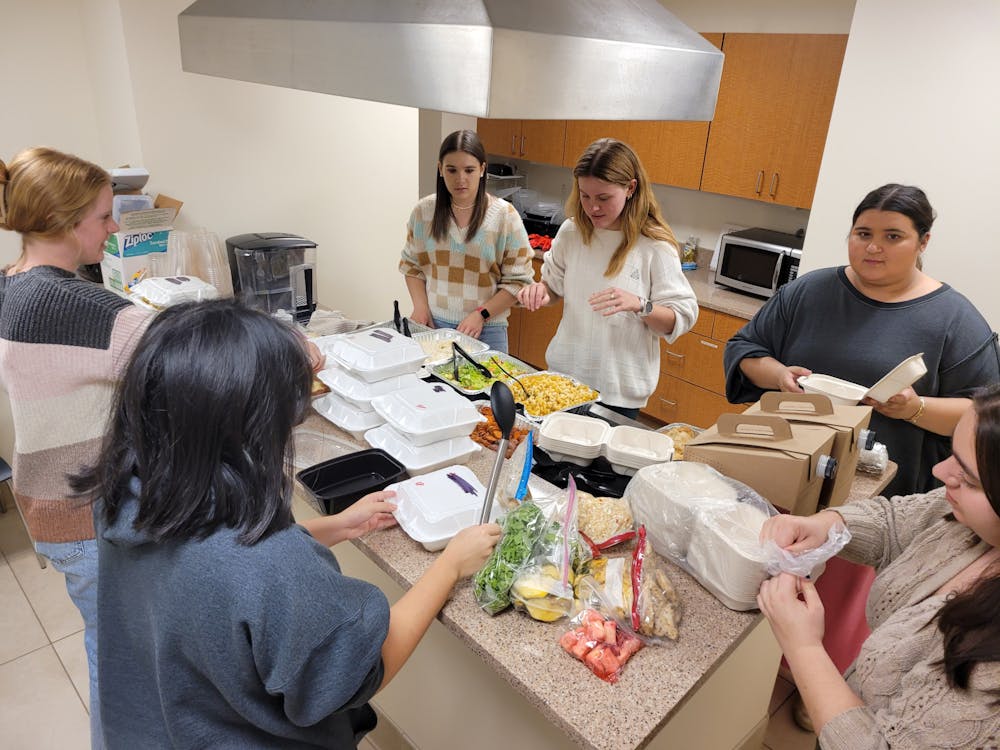While the University helps provide students with a plethora of dining options, both internally and through external organizations, Charlottesville City reports an 11.8 percent food insecurity rate, almost 4 percent higher than the average in Virginia. FoodAssist, a chapter of the Food Recovery Network, is completely student-run and aims to reduce food waste by transporting extra food from restaurants to local shelters and food pantries.
Members of FoodAssist conduct “food runs” wherein local partners like U.Va. Dine, Chick-fil-A, Chipotle and Bodo’s Bagels donate frozen and fresh food that is left over due to excess production to be transported to the Community Food Pantry, the Salvation Army and other local shelters and pantries.
Victoria Erber, FoodAssist member and second-year College student, transports donations from the Woodbrook location of Chick-fil-A roughly twice weekly. From wraps, to fruit, frozen soup, biscuits and salads, donations provide sustenance to dozens of people each run.
“I, on average, have like a hundred pounds of food that we'll take to the Salvation Army,” Erber said. “So, it just feels good, because that's a lot of food.”
Around 85 percent of unused food in restaurants in the U.S. is disposed of, not only wasting the food itself and funds towards it but also creating a massive carbon footprint due to gasses released during decomposition.
Restaurants in the Charlottesville community are not immune to this trend of waste. Erber notes her experience with food waste at a popular Corner restaurant, Take It Away.
“I worked at Take It Away for a little bit,” Erber said. “They threw away so much food after every single shift. They had bread that they would just throw away. I realized this just doesn't seem like the right thing to do because the United States doesn't have a food production problem — it has a food distribution problem.”
Garreth Bartholomew, president of FoodAssist and second-year Batten graduate student, said this semester alone, FoodAssist has donated 5,000 pounds of food that would have otherwise gone in the trash. This equates to about 4,500 meals and around 20,000 pounds of greenhouse gasses that would have been anaerobically digested had the food been wasted.
FoodAssist’s record of redistributed food donations has doubled each semester for the last three semesters, Bartholomew said.
James Battaglia, who works on Salvation Army Development and Public Relations, notes the value in the donation of time and labor that FoodAssist offers.
“FoodAssist provides us a valuable resource that they actually are providing transportation and bringing us these valuable resources,” Battaglia said. “Sometimes we base a lot of our services on volunteers, and sometimes volunteers get busy or they can't come in. And FoodAssist is always there to bring us those resources for food.”
While battling climate change, conquering food insecurity and leaving a positive impact on one’s community may seem like insurmountable tasks, FoodAssist offers a way to take a step towards change.
“We talk about poverty and food insecurity [like] it's overwhelming and we can do nothing about it, and we talk about the Charlottesville community [like] it's too far away and we can do nothing to help them,” Bartholomew said. “FoodAssist proves that all of that isn't true… It's a band-aid on the system, but it's enough to stop the bleeding in some way shape or form.”
According to Kerri DeMaio, food programs manager at the Haven, important facets of fighting food insecurity include, at the top of the list, volunteering and education on the issue. She notes the importance of health in society. According to DeMaio, access to nutritious food improves health, performance in school, energy and productivity.
“[When] you have a healthy, happy society, you have a better society, ” DeMaio said. “I think that us being part of that society, we all need to do better. We all need to work for everybody… let's move to where we're actually taking care of each other.”
To work towards this ideal, happier, healthier society, FoodAssist provides an opportunity for a new generation of community members to make efforts towards a well-fed Charlottesville community.
“What [FoodAssist is] doing by stopping food waste, and then being able to get it out to different people in the community that, you know, it's obviously a very good resource… seeing younger generations continue the work is important for the future,” DeMaio said.







